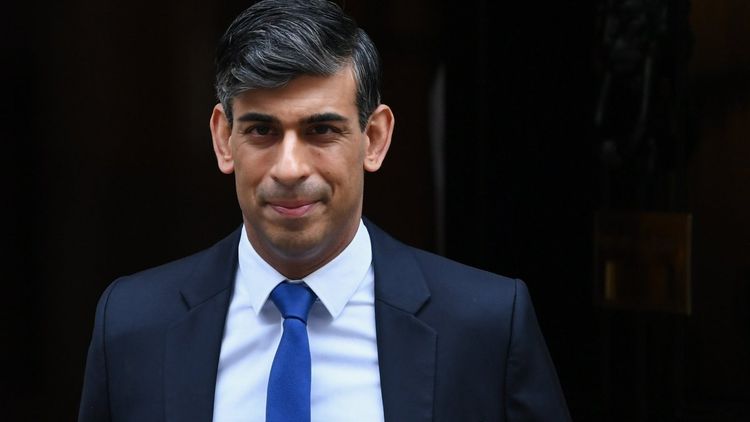Rishi Sunak’s reset week is a media disaster

Tory MPs Lose Faith In Government Amid Continuous Bad News
As of 4:02 pm on April 1st, 2024, the following information is available. Please note that there have been updates since the original post at 4:23 pm.
This week's Downing Street schedule, which outlines the government's media strategy for highlighting important initiatives, is aimed at demonstrating the actions being taken to improve the lives of voters.
Lowering taxes, providing complimentary childcare, and increasing the minimum wage are all measures that deserve appreciation. Despite criticism, Rishi Sunak remains optimistic that these policies will gain public support.
The issue at hand is that on a weekly basis, the Downing Street plan is said to focus on a particular subject matter. However, as time passes, it becomes evident that the news reports are centered around a completely different topic.
Occasionally, unexpected situations arise, such as the recent remarks made by Tory contributor Frank Hester regarding Diane Abbott. More commonly, it is a gradual accumulation of negative poll results, indicating a massive Tory defeat in the forthcoming general election. Even distributing free ponies wouldn't change the focus of attention from these types of stories.
Despite Sunak's efforts to bring attention to his policies in the news, the issue lies in the fact that the focus is not on their effectiveness. Instead, people are questioning whether or not these policies will actually succeed.
When the government announced the free childcare policy, it didn't seem like a great idea. The early years sector quickly pointed out that they were already dealing with a lack of staff and financial difficulties, resulting in some nurseries shutting down unexpectedly.
It is not a hidden fact for the guardians residing in England that receiving 15 costless hours each week for their two-year-old children is beneficial. However, they must have gone through the unpleasant experience of confronting substantial waiting periods in their surroundings. Besides, they might have acquaintances who thought they have successfully managed to arrange childcare and employment, but unexpectedly their offspring’s nursery had to be shut due to the unmanageable financial situation.
It appeared unlikely to propose boosting the requirement for a sector already experiencing difficulties: according to the University of Leeds, nurseries currently require over 11,000 additional employees to accommodate this growth.
The ministers are feeling extremely dissatisfied with how the launch preparations have been overshadowed by technical difficulties regarding whether parents are eligible to receive the funds. At the beginning, there were problems with the application process. This program was anticipated to be very successful by the ministers, but it has turned into a situation where they have to constantly defend it.
The main issue at hand is that people who vote (as well as many Members of Parliament) are skeptical about the Government's statements. There was a time when Conservative MPs would hope that voters would be receptive to their party's offerings of tax cuts and other perks. However, now they realize that people are not paying much attention, and even if they are, they don't believe the information being presented.
Many people have doubts about the benefits of the 2p national insurance cut that will be implemented on Saturday. They suspect that they will end up paying for it in some other way after the election. Moreover, there is a lack of confidence in the childcare policy. People simply do not think it adds up.
The absence of trust is not limited to voters alone. It is worth mentioning that even ministers are hesitant to support their own administration's initiatives because they don't have confidence that they will succeed.
Check out how Kevin Hollinrake, who doesn't normally cause trouble as a minister, did not support the proposed law against rough sleeping when interviewed on TV. When asked if he would back a law that makes "disruptive rough sleeping" illegal, Hollinrake gave a strange response: "I don't have the authority to make that decision. I'm curious to see the law as it moves forward and the Prime Minister's plans." In simpler terms, he meant "I won't defend this policy because it won't last for long."
Hollinrake must have known that a few of his coworkers, like Mel Stride and Graham Stuart, had to work hard by participating in broadcast segments when Hester's statements became known. They both refused to acknowledge that Hester's comments about Diane Abbott were "racist." However, Downing Street turned around later in the day and officially used that term, after all.
Being publicly embarrassed is something nobody enjoys, and if it happens too frequently even to faithful government officials, they will no longer defend controversial policies. To put it differently, they will lose faith as well.
As of now, the party's standing in the polls is not promising, so one would need to be overly optimistic to think that the Conservatives will be victorious in the upcoming election. However, up until the recent past, a majority of Tory MPs were in agreement that Sunak was the person who could help prevent their downfall.
As of now, with alarming figures being reported almost every day, creating a media plan that includes positive stories for the week seems like a display of hope despite the overwhelming evidence suggesting otherwise.









































